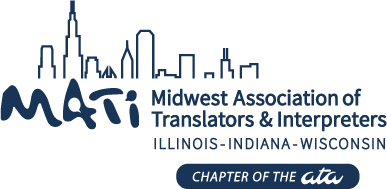Receive a link to watch the recording of the following webinar.
MATI does not award CEUs for accessing recordings of webinars. CEUs are only awarded to those who attended the live webinar.
Speech Pathology and Medical Interpretation is presented by Angela Luther, who is a Certified Healthcare Interpreter and has her Certificate of Clinical Competence in Speech-language Pathology.
Many interpreters are trained in practices for healthcare interpreting generally, but do not have specific training for speech-language pathology. While all ethical principles apply to speech-language pathology, the nuances of interpreting for a person with a communication and/or swallowing deficit can impact many factors in the interpreting encounter.
The presentation serves as a way to foster more collaboration between interpreters and speech-language pathologists. The presentation serves the following purposes:
· Give interpreters concepts and vocabulary for better communicating with speech-language pathologists.
· Briefly explain common treatments in speech-language pathology in the United States in comparison with other countries
· Explain expanding roles and positioning for interpreters during communication evaluations and treatment sessions.
· Explain rationale behind expanded interpreter roles in assessment and treatment.
· Give interpreters a format for scheduling collaboration time and explain expectations of many speech-language pathologists.
· Discuss practical applications of different formats outlined for collaboration.
Rationale
In my experience as a person in both roles, interpreters and speech-language pathologists have similar goals and understandings, but often lack the common vocabulary for effective collaboration. I have found that this is easily alleviated through the use of common vocabulary and expansion of common concepts.
I have also found that there are differing expectations of interpreters by the interpreters themselves and the speech-language pathologists. It is important to expose these differences to alleviate tensions that arise between the speech-language pathologists and interpreters. I cover the speech-language pathologists’ expectations assuming that most interpreters share similar role expectations.
I present a format for collaboration outlined by the American Speech-Language-Hearing Association in hopes of putting interpreters at the forefront of what is considered best practice for collaboration with interpreters in speech-language pathology. Not all speech-language pathologists will be well-versed in this newer model of collaboration and the interpreter can help promote best clinical practices.
